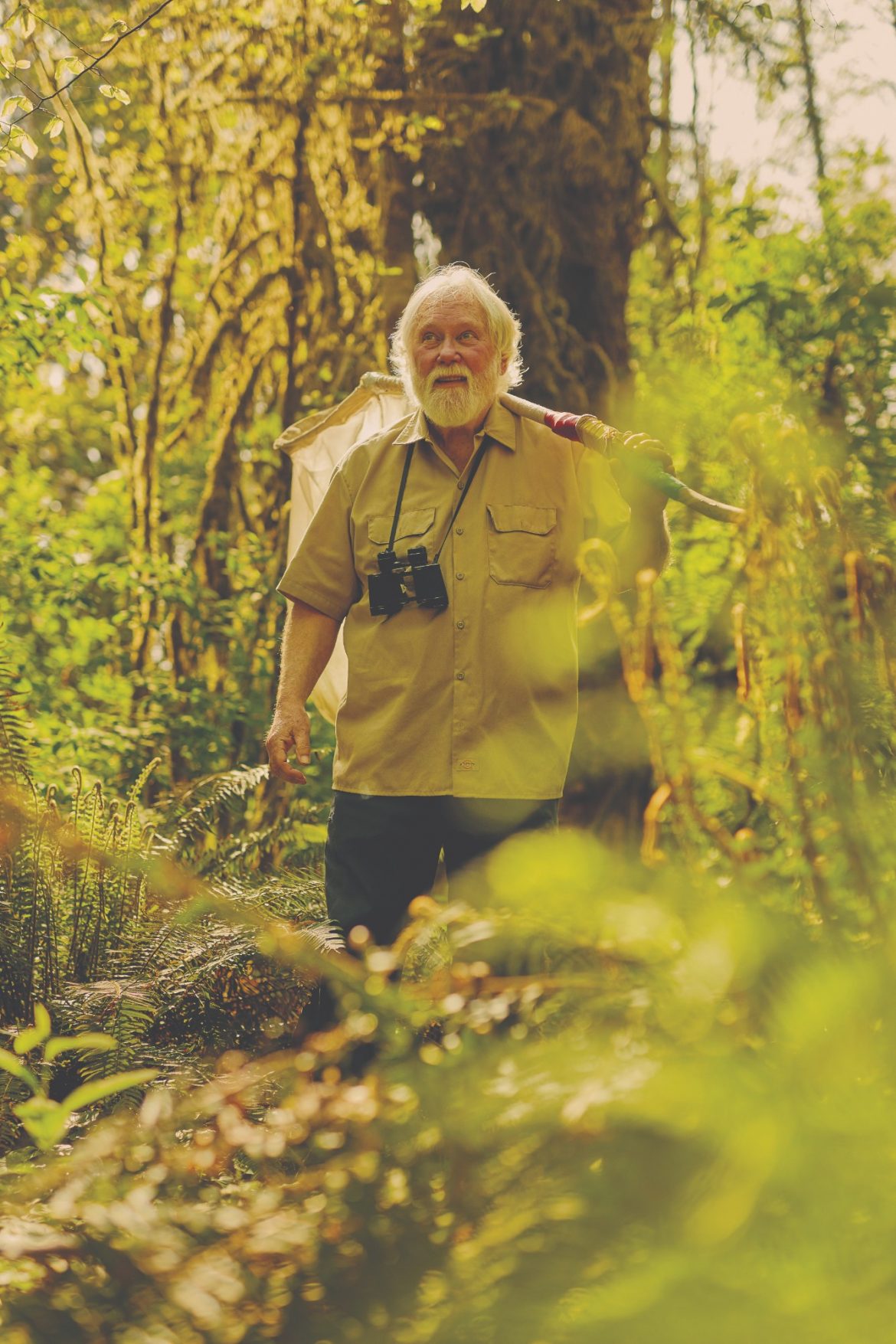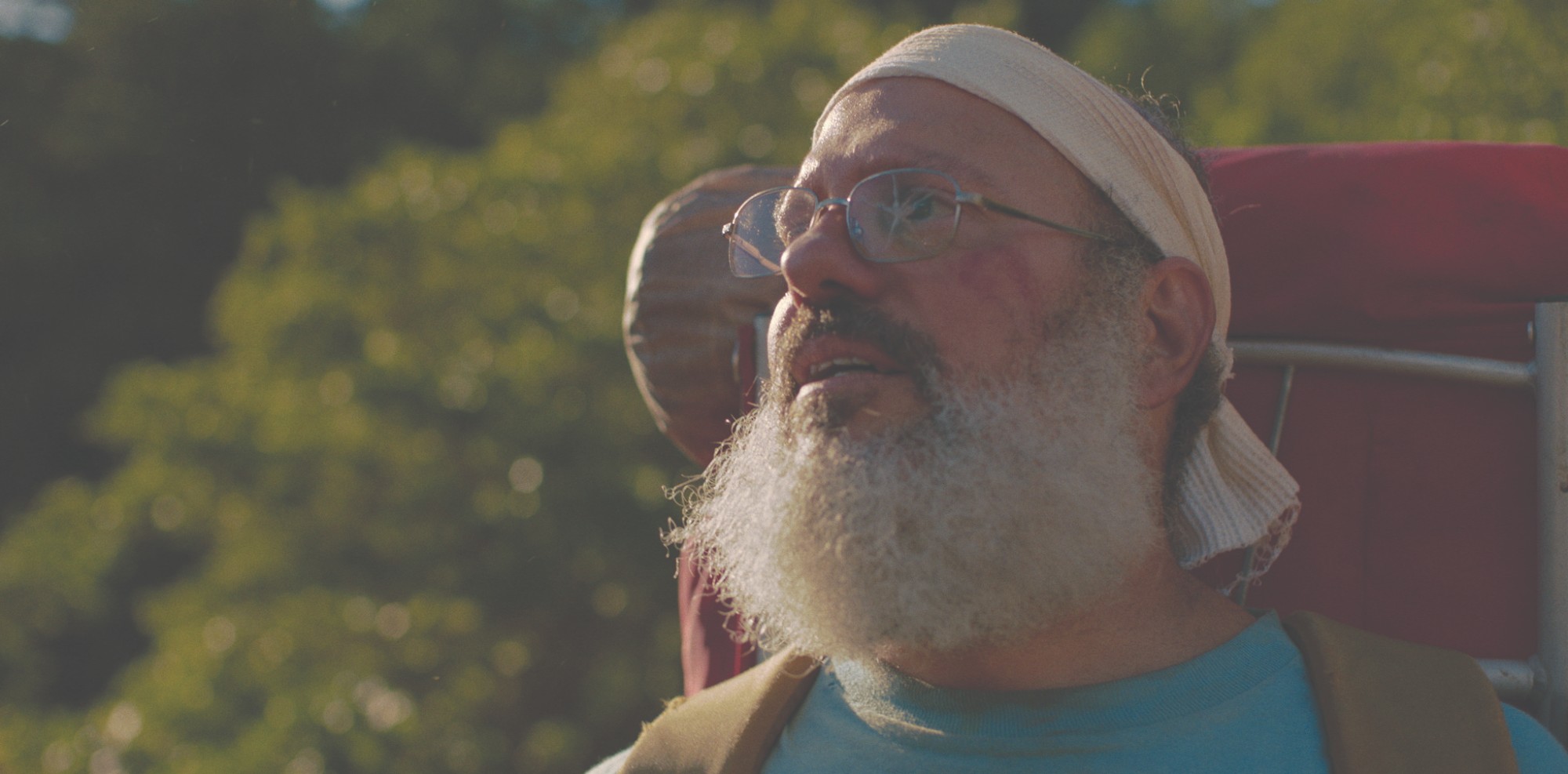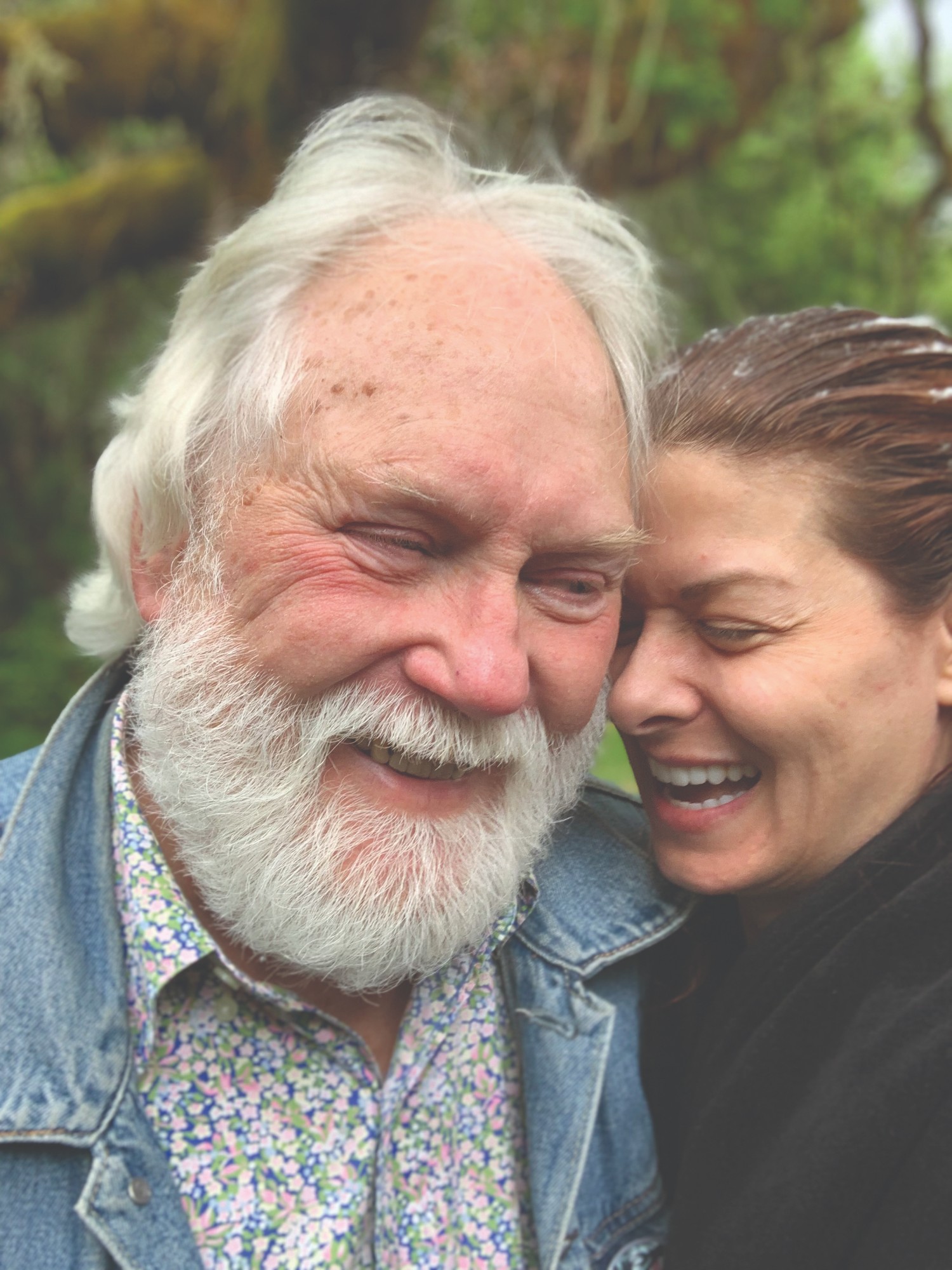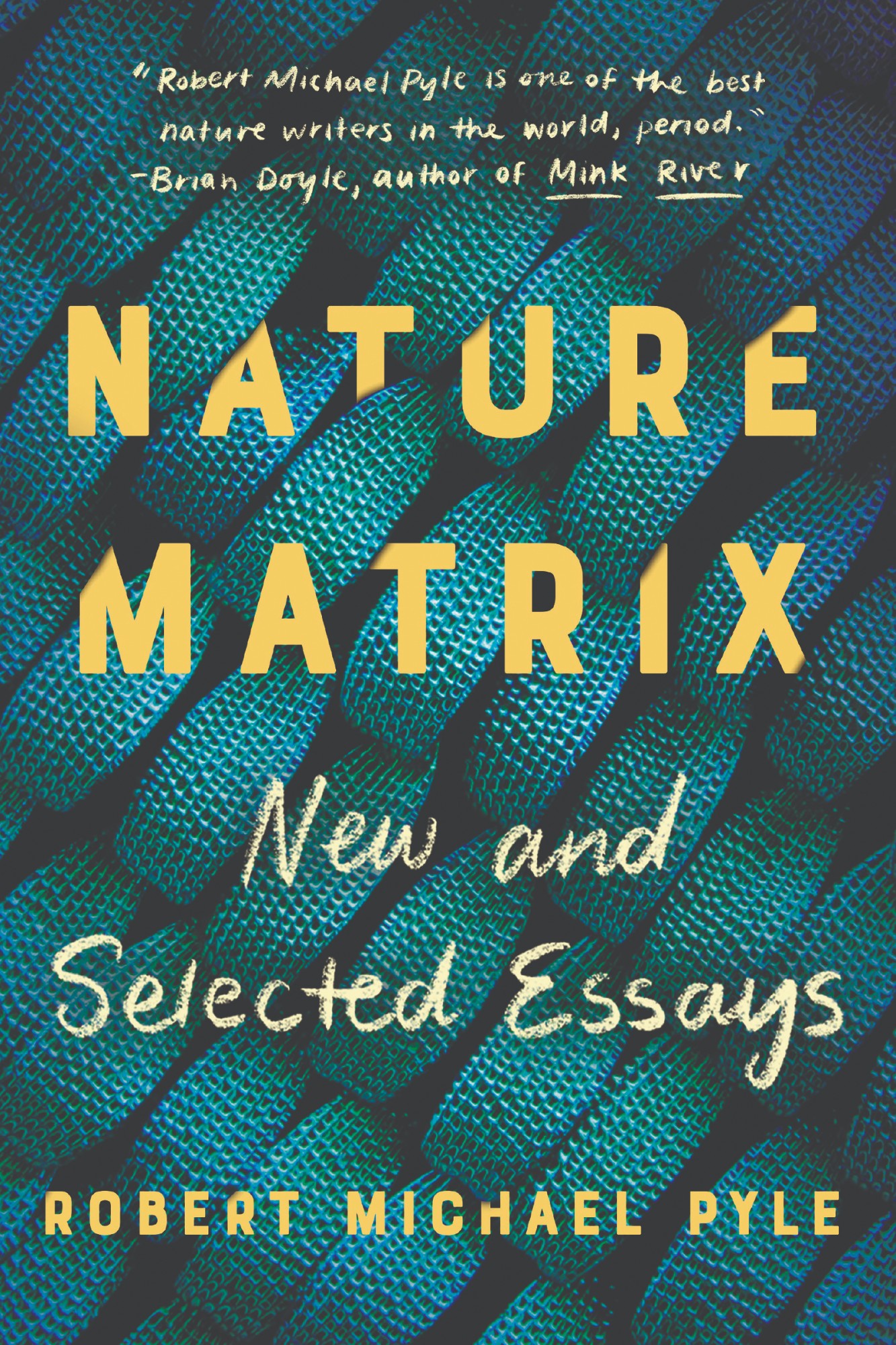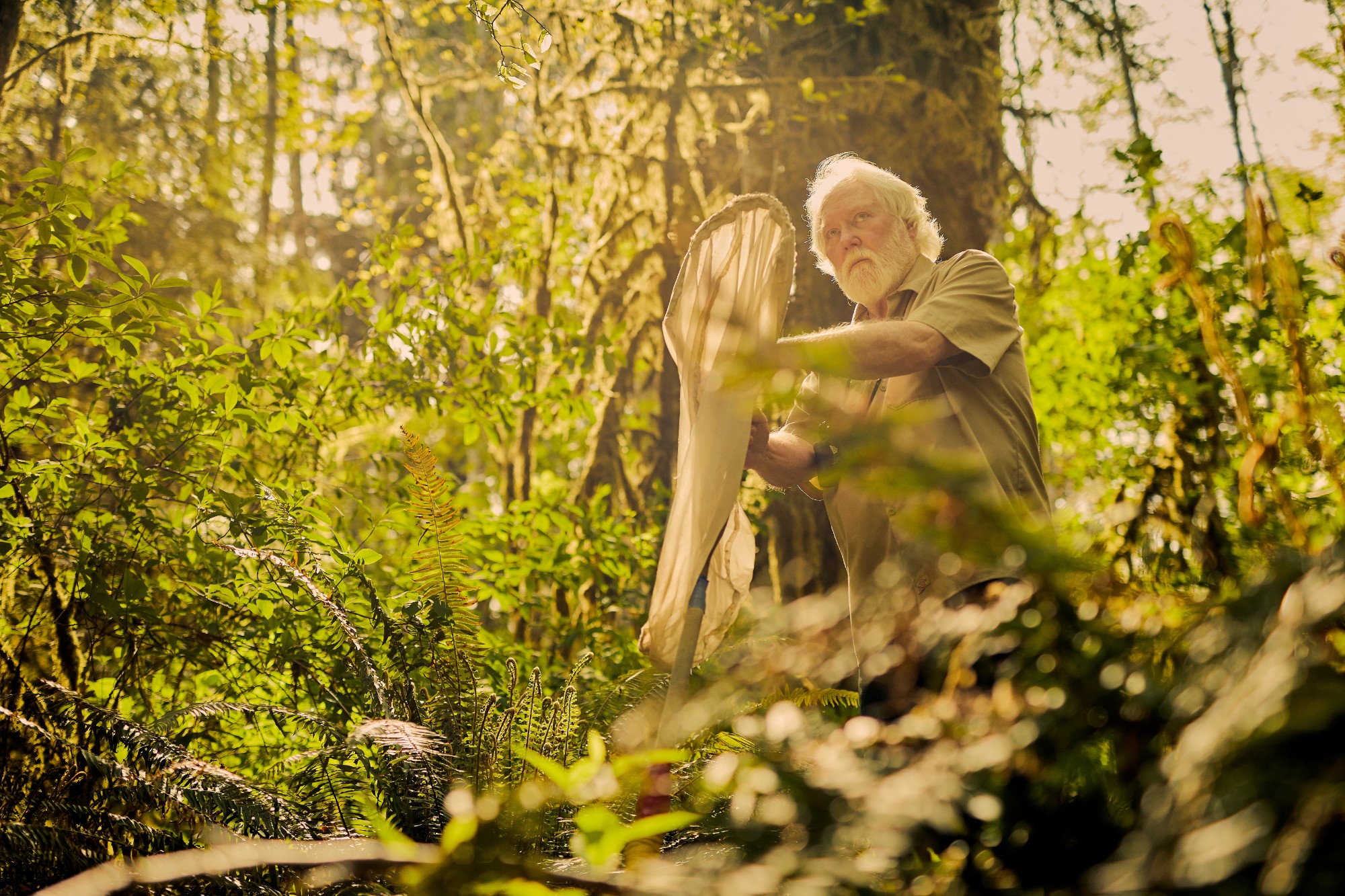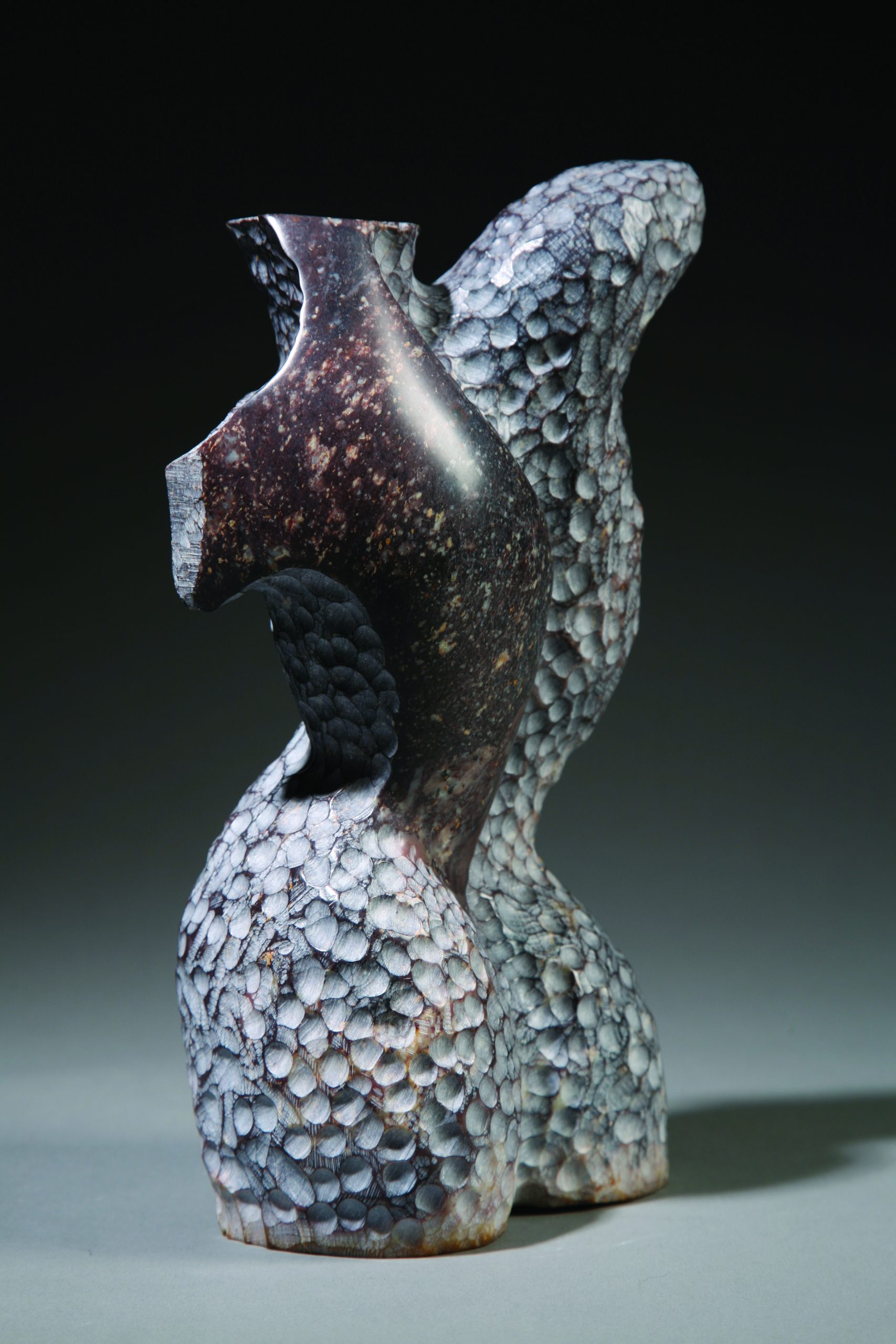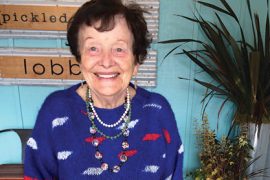Renowned butterfly expert, natural history writer, novelist & poet Robert Michael Pyle is the subject of a feature film, has three new books, an album & a new focus
written by Cathy Carroll
Sweating hard and grunting, he made slow, steady progress, keeping his eyes down in the steeper bits, which showed him the tracks of bobcat and deer and the scat of coyote. “Finally topping out, some forty-eight hundred feet above Puget Sound, I gained the spine called Juniper Ridge,” Robert Michael Pyle wrote in Where Bigfoot Walks: Crossing the Dark Divide. “A big orange day moth wafted overhead, and a huge nymph of a short-horned grasshopper, about as fast and graceful as I, trundled up the trail. Given the choice, I would be the moth. … When I reached the ridgeline at last, feeling lightheaded at this little success and the grand views, I stood, legs apart, and gazed east.”
A breeze plucked a small, mottled gray-and-beige feather he’d tucked into the band of his gray felt hat, dropping it on a rock just over the edge. Before he’d left his farmhouse in the Willapa Hills, his wife, Thea Linnaea Pyle, an artist and botanist, had asked the Yale- and University of Washington-trained butterfly expert to promise not to chase the winged nectar-feeders while wearing his heavy pack. “But this seemed safe, so I inched over, cleverly facing uphill so as to keep my purchase on the slope,” Pyle wrote. “I bent, reclaimed the feather, and stood up. Then, having risen to a lighter head than I remembered, I began to fall over backward.
“Swinging at thin air with Marsha, my big butterfly net, I caught enough breeze to tug my higher-than-usual center of gravity back across the fall line and landed on my knees facing uphill. Crawling to the ridge I sat, shook, and looked down the route I’d almost bought. The long, steep slope offered no arrest for hundreds of yards. Rolling over the sharp and lumpy pumice, my joke of a load shoving my face into the cheese-grater slope, I could have been badly injured and stranded far below. I branded BE CAREFUL, DUMMY! on my frontal lobe, rose with difficulty, and went on.”
The esteemed natural history writer, novelist and poet was two weeks into his month-long hike into the heart of the Dark Divide, the largest unprotected roadless area in western Washington, about 76,000 acres in the Gifford Pinchot National Forest, stretching from Mount St. Helens to Mount Adams. With forests of 500-year-old trees, a home to the endangered northern spotted owl, it has been in the crosshairs for loggers, road builders and those who want to keep it wild.
Pyle’s trek formed the basis for the film The Dark Divide, released last fall with actors David Cross portraying Pyle and Debra Messing in the role of Thea. Getting a feature film made about a lepidopterist with a Guggenheim Fellowship exploring the healing power of nature in a place known for Bigfoot sightings—a mix of Jack London and Henry David Thoreau—was not easy. For a decade, award-winning Los Angeles-based film director Tom Putnam kept on that uphill path, Pyle’s writing resonating with the displaced Oregonian’s love for a childhood spent hiking and fishing in the Gifford Pinchot forest.
One benefit of the lengthy effort was that it allowed Putnam to weave a script incorporating seven of Pyle’s twenty-four books, particularly the poems he channeled after Thea’s death in 2013, after a decade of living with ovarian cancer. That emotional palette illuminates Pyle’s insights into other dark divides: between love and loss, logger and environmentalist, Native and non-Native American, science and superstition, human and Sasquatch.
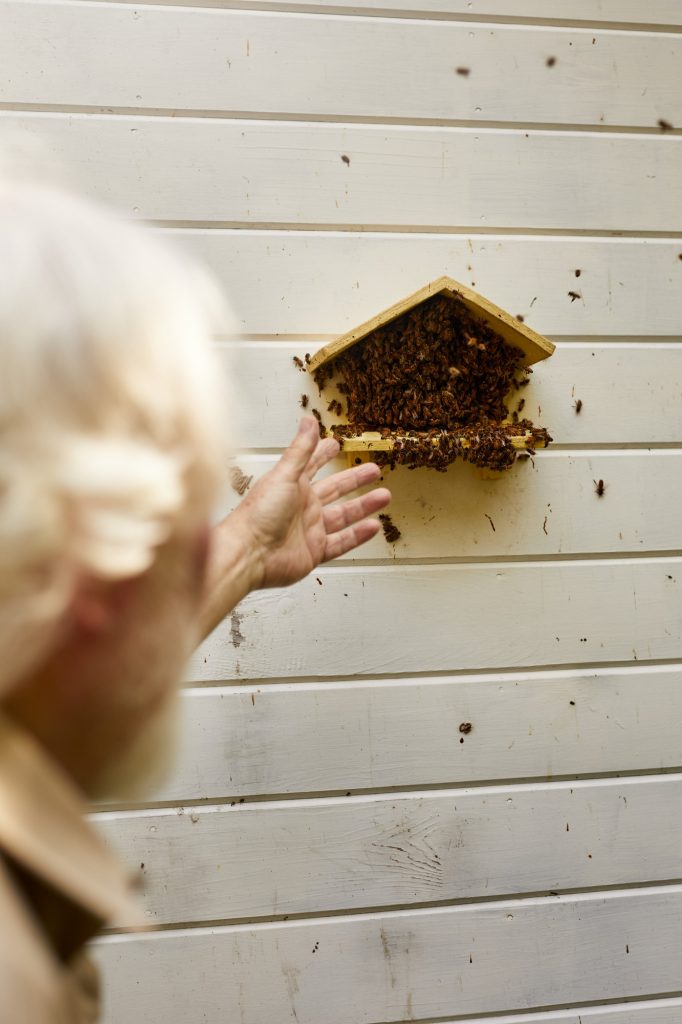
Photo: Cam Östman
Above all, Pyle considers one divide the most dangerous—the one that humans put between themselves and nature. “This is the centerpiece of my whole philosophy,” he said. “That people and nature are not a duality. They must not be. When there’s a line between humans and the rest of nature, then we are undone, for we have to consider ourselves to be an intimate, an integral part of nature and vice versa. If we retreat to nature as if it’s something other than ourselves, it licenses all the enormities we may commit against the rest of nature. So, as I say, one is in nature everywhere, since there is nothing else.”
Throughout his work, particularly in his love letter to the place where he was drawn forty years ago, Sky Time in Gray’s River: Living for Keeps in a Forgotten Place, he details how a simple walk out his back door to the compost one morning can be part of what builds a life that’s transformative—even ecstatic:
“I was arrested by the sight of a leaf pinioned on a rush spike. … It hung there, impaled as it fell from the tall white wand of the birch. Shivering on the light November air, the leaf was like a moment of grace before the fall,” he wrote. “… None of this is high adventure, but it meets my hope for a home where boredom remains at bay. … See the bleeding hearts fan, the trilliums crack, the banana slugs strike out from their cold-weather hideaways for fresh pastures of moss … on what Robert Frost called ‘Blue Butterfly Day.’ These things are as important to me as love, and in fact, that’s what they are.”
Long out of print, Counterpoint Press reissued the nature writing classic in paperback in January, just a few months after releasing Nature Matrix. It encompasses Pyle’s ethic and wit, from his experience as a young national park ranger in the Sierra Nevada to observations on the streets of Manhattan to a deep profile of fellow lepidopterist Vladimir Nabokov. Pyle’s newest book of poems, The Tidewater Reach, followed.
In the essay collection, named a finalist for the prestigious PEN Award, he reconsiders his trademark concept, “the extinction of experience … People who care may make choices to conserve; but people who don’t know, don’t even care. What is the extinction of a condor or an albatross to a child who has never known a wren?”
After a trifecta of a movie, three books and a prize nomination, came the winter release of the album Butterfly Launches from Spar Pole, with fellow Willapa Hills resident and Nirvana bassist Krist Novoselic on acoustic guitar. As the world was locking down, Pyle’s was opening up. His agent called. The time seemed ripe for asking if he’d like to do a new book. The 73-year old would.
It will draw from his half century of environmental and conservation work, born in the late 1960s, when Pyle was at UW. He’d discovered that an old dump covered with dirt, crawling with rats and leaking methane, had been a thriving marsh around 1912, when his grandmother studied there. The university had plans for it—a parking lot and playing fields. While other students were marching against the Vietnam war and taking over the president’s office on upper campus, Pyle led a few hundred protesters to occupy the fill, demanding topsoil and trees. They won, and in the fifty years since, it has become one of the finest urban wildlife habitats in the nation, home to UW’s Center for Urban Horticulture and the 74-acre Union Bay Natural Area, an ecological restoration laboratory.
During that time, Pyle established insects as a conservation concern, and founded the Xerces Society for Invertebrate Conservation, which has led to a focus on insect conservation around the globe. The nonprofit’s executive director, Scott Hoffman Black, internationally renowned in his field, recalled his first introduction to “Dr. Pyle,” the illustrious author of the National Audubon Society Field Guide to North American Butterflies, which Black bought as a young man. “But once I met him, I found he was really one of the easiest people to communicate with,” he said. “His affable character puts everyone at ease, and he is thoughtful of everyone he meets—making sure he engages them in meaningful conversation. People walk away from meeting Bob enriched by the encounter and inspired to become more involved with butterfly conservation.”
Pyle’s work has extended from Tasmania to Tajikistan, New Jersey to New Guinea, from exotic wilderness to damaged lands such as the Willapa Hills—open field for literary and natural history writing. “There are reasons for that. It’s a pretty beat up, over-logged, wet, soggy, ignored place,” said Pyle. “Subtle in its terms, but I found those terms compelling, and they’ve been very rich to me for forty years.”
This new book, though, will head in a new direction. “I still care and I’m still active and mildly hopeful, but I am exhausted by the jeremiads—and the elegies—and the testimonies of loss,” he said, wincing. There’s an entire genre of important, vital books about climate change (including Moral Ground: Ethical Action for a Planet in which Pyle’s testimony is among those of more than eighty visionaries, from the Dalai Lama and Barack Obama to Gary Snyder). “Well, I don’t want to write another one of those. I don’t want to write anything more … about loss and what’s coming.”
He eschews Pandora as well as Pollyanna. “What I want to write about now are the stories in my life that have kept me going. The joy. The fun. The celebration. Like what Patti Smith sings in ‘Jubilee:’ ‘ Come on girl, come on boy, be a jubilee.’ The gratitude of living and that which the earth, in all of its diminished condition thanks to us, continues to furnish and will continue to furnish depending on our focus and depending on our willingness to look closely. Pay attention. And truly attend to the real physical attributes of the living and supportive world.”
This credo is largely what distinguishes The Dark Divide’s male protagonist from those of nearly every other film, said the director. “One of the things I loved about Bob’s book is that he shows a very different perspective on what it means to be a man or what it means to take control of your life … and it was something that I related to a lot more than Bruce Willis in Die Hard. To watch a movie about this introverted, introspective quiet person … and watch him grow into something more self confident and stronger. That was really exciting to me. That was the kind of role model I want to see in movies more, and that I want to be a part of helping create, because I think it’s much more realistic and speaks to our better angels.”
Yes, Pyle’s strong willed and tough, said Putnam. “But his engine is kindness and compassion, and I think he’s one of those people who showed me that those are strengths and not vulnerabilities.”
He hopes his film reveals, particularly in its quiet moments, the poet’s gift for beautifully laying bare some of the most painful moments in his life. The camera lingers, and we watch as Cross portrays Pyle stopping on the trail, looking at flowers that remind him of Thea. “We just sit there for like a minute, and watch his emotion sort of tumble out in a way that I think surprises him,” said Putnam. “That is all Bob, I think, in terms of that willingness to share your innermost self with people … it’s very present in his poetry, in particular the couple of books of poetry he wrote after Thea had died, which are, I mean, heartbreaking.”
All the spiritual succor Pyle requires, though, is in the physical world, and the act of noticing the particular. “Preferably the particular which is beyond our own selves and egos, and it will take us even momentarily outside our quotidian concerns and worries and preoccupations. I obsess over these things like anyone does, but I try to make darn sure that every single day I at least go out and allow myself to be beguiled. And enchanted. And seduced by the simplest details.”
For clips from The Dark Divide and more about the album Butterfly Launches from Spar Pole, visit www.1889mag.com/robert-michael-pyle.


